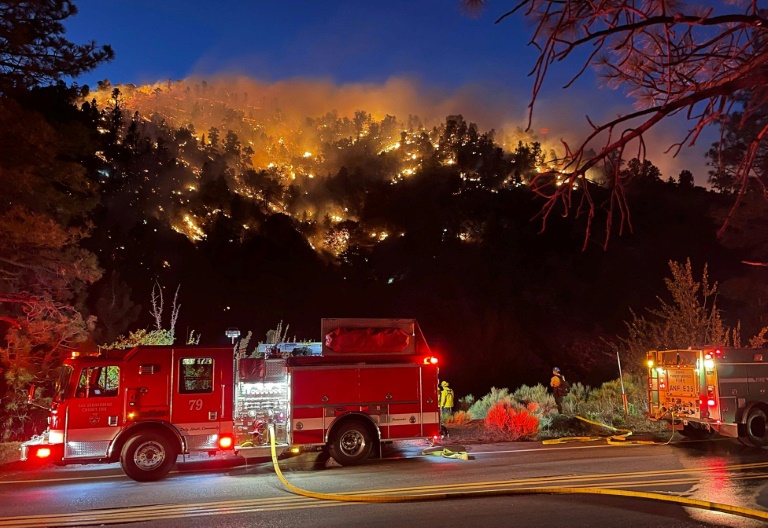A wildfire was burning out of control Monday in forest outside Los Angeles after a weekend of record-breaking temperatures, and as forecasters warn of fire danger across the parched US West.
Almost 1,000 acres (400 hectares) had been charred by the Sheep fire since it erupted in the Los Angeles national forest on Saturday evening.
Thousands were warned to evacuate their homes in the community of Wrightwood, with the fire just five percent contained.
Firefighters battling the blaze said it was ripping through an area with thick vegetation.
“The terrain is very steep — it’s a bad area,” Alison Hesterly of Cal Fire San Bernardino told the Los Angeles Times.
Over 200 firefighters were battling the blaze, including from the air.
“They’re really focusing hard on the edges on the northwest side and the south end to secure those edges, to hope that the wind won’t blow the fire out of the containment lines,” Hesterly said.
“That’s a huge focus for today — securing those high-risk areas with hose lines and hand lines.”
Video on social media showed towering flames gripping trees and being fanned by strong winds.
The fire erupted as parts of California and the West were smothered in extreme heat, with temperatures in Palm Springs on Saturday hitting 114 Fahrenheit (45.5 Celsius), the highest for the day since records began.
The Southwest has been baked by a once-in-a-thousand-years drought that has left vegetation exceedingly dry and flammable.
Fire chiefs are warning that 2022 looks set to be a terrible year for wildfire.
“Given the fuel conditions, the fire conditions that we’re here talking about, I foresee a very tough four, five, six months in front of us,” Orange County Fire Authority Chief Brian Fennessy said last week.
The National Weather Service said Monday that fire danger was widespread across the region.
“An expansive area of critical fire weather conditions is expected across the Southwest into the southern and central Rockies and High Plains,” the NWS said on its website.
“Red Flag Warnings have been raised today for large portions of southeastern Utah, southwestern Colorado, northern and central Arizona and New Mexico today.
“Dry and windy conditions will promote the rapid spread of fires across these areas.”
In New Mexico, hundreds of thousands of acres of forest have been consumed in wildfires that have been burning for months.
US President Joe Biden on Saturday flew over some of the blazes, before being briefed on efforts to combat the fires.
Temperature variations and wildfires are both expected parts of the natural cycle.
But global warming, driven chiefly by humanity’s unchecked burning of fossil fuels, has knocked the climate out of kilter.
Hot periods are hotter than they were and weather cycles are less stable.
This has exacerbated droughts and vastly increases the risk of disastrous wildfires.









